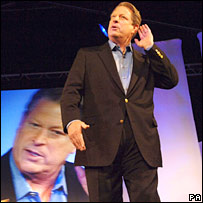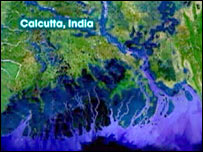|
By Richard Black
Environment correspondent, BBC News website
|


An Inconvenient Truth sees Al Gore emerge as a superb communicator
|
Who is Al Gore? Is he Woody Allen, cinema auteur and self-deprecating comic? Is he Richard Feynman, science lecturer extraordinaire? Or is he the Bogeyman, scaring credulous audiences into a rapture of guilt and worry?
All these comparisons came to mind as I watched a preview of Gore's movie An Inconvenient Truth in a cinema buried in the bowels of London's West End last month.
In his own words, he "used to be the next president of the United States" - an introduction which had the audience of environmental activists and policy wonks chuckling in our polite British way, even as the audience on screen - for the film is based on public lectures which Gore has been giving for the last few years in the US and elsewhere - whooped and hollered.
This was not the last taste we would have of Gore the communicator. In contrast to the wooden figure who lost - sort of - the 2000 presidential election, here was someone who could "do" the homespun American charm which Ronald Reagan had in spades; but without the cheese.
But, as he reveals in the movie which has just been released in the UK, Gore has much more than that.
He has a brain which understands and holds figures and arguments. He has a team of advisors who provided the raw material for a hand-held tour through the intricacies of climate change science.
Out of the textbook
An Inconvenient Truth takes climate science out of the textbook and moulds it into something which we can see and almost taste.
"This is Mount Kilimanjaro 30 years ago," he says before an image of Africa's snow-capped landmark.
As the shot changes to a nearly snow-free peak: "And this is it last year. Within the decade there will be no more snows of Kilimanjaro."
He plays the same then-and-now trick for a Patagonian glacier, before moving into the future.
Melting of the West Antarctic icecap would raise sea levels globally by about 7m (22ft) - so what would that do to major coastal cities?
Computer simulations show us this future for Shanghai, for Calcutta - and then for New York, the final heartstring tug coming as the World Trade Center memorial site disappears under the waves.
This is more than sentiment, however. The subtext is clear: what we have done for victims of terrorism will be compromised by what we have not done on climate.
In denial
Segments of the movie follow Al Gore away from the lecture theatre and the political streets of Washington.
 |
 It is difficult to get a man to understand something when his salary depends on his not understanding it
It is difficult to get a man to understand something when his salary depends on his not understanding it

|
Most movingly, he speaks of his sister's death of lung cancer. And as he speaks, we see him stroll through the farm where his father used to farm tobacco, denying the growing evidence of its medical carnage.
After the death, Gore tells us, his father farmed tobacco no more.
We are similarly denying now, he says, the growing evidence of greenhouse damage; we should learn, he implies, and quit before the morgues are full of climate casualties.
With a quote from the socialist author Upton Sinclair he hammers fossil fuel lobbyists: "It is difficult to get a man to understand something when his salary depends on his not understanding it."
Rage down under
An Inconvenient Truth has garnered some positive reviews in the US, where it has been in cinemas for about four months.
"In 39 years, I have never written these words in a movie review, but here they are: you owe it to yourself to see this film," wrote Roger Ebert in the Chicago Sun-Times.
"If you do not, and you have grandchildren, you should explain to them why you decided not to."
For Janos Gereben of Entertainment Insiders, it is "...a well-reasoned, clearly-proven, intelligent, cogent, irresistible torrent of scientific data, in a curiously warm, engaging, often funny presentation."

Icecap melt would see coastal cities inundated with flood water
|
And to some extent it has clearly captured the attention of the wider US, where 2.3 million people have seen it and turned it into the third highest grossing documentary of all time - though to put that in perspective, the takings of X-Men: The Last Stand, which opened on the same weekend, have been 10 times higher.
Of course, not every one liked it. It has just opened in Australia, to the annoyance of industry minister Ian Macfarlane, who fumed that he would not look for advice from "...unsuccessful candidates for the US presidency who cannot even convince their own people", or from a movie.
A few flaws
An Inconvenient Truth does have its flaws. It leaves out some of the uncertainties in projections of climate change, and could be accused of concentrating on worst-case scenarios - although as Chris Rapley of the British Antarctic Survey has pointed out, worst-case scenarios can turn out to be the ones that happen.
In interviews, Gore has revealed hints of the hubris taint which dogged his political career - remember the comments about him claiming to have invented the internet? - telling the BBC he had "wanted to tell this story for 30 years", which means he was aware of the climate hazard before most of the global scientific community.
Most glaring was the pitifully small screentime he gave to solutions. We have the tools we need to sort climate change, he said, before the most cursory treatment of "stabilisation wedges", a fascinating way of conceptualising the social adoption of green technologies which would have flowered in an extended Gore-style treatment.
But perhaps he didn't want to be prescriptive. The main aim, I think, was to scare viewers - to wake people, particularly Americans, from a coal-fuelled comfort zone and demand action from political leaders.
And in a congenial, user-friendly, understated way, he has perhaps created the most terrifying movie of all time.
Richard.Black-INTERNET@bbc.co.uk


~RS~q~RS~~RS~z~RS~56~RS~)